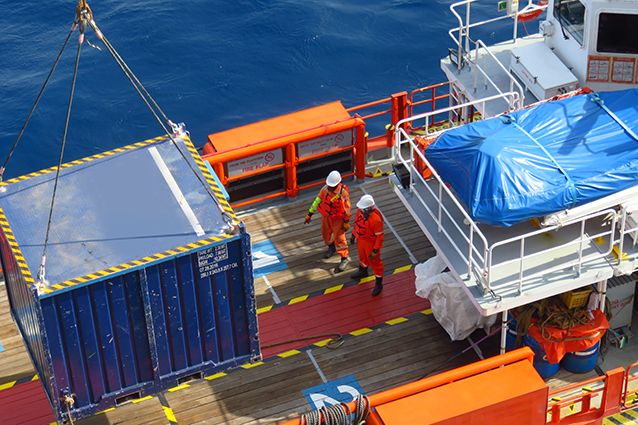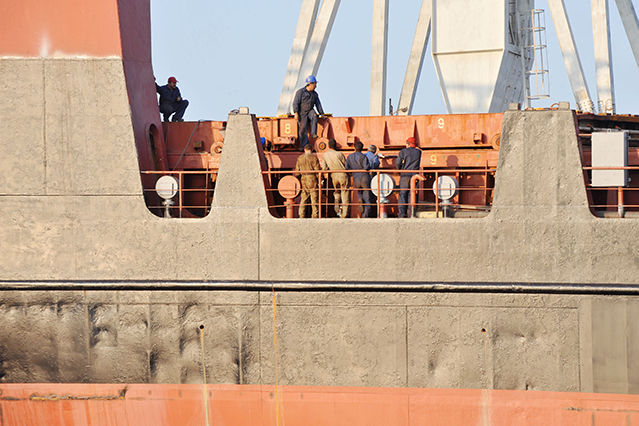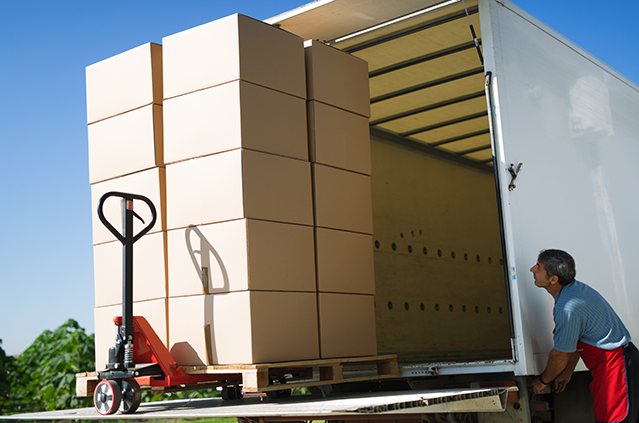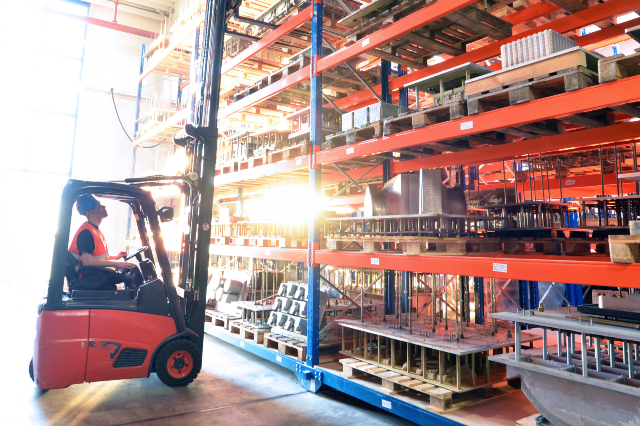The Invisible Transport Workforce Keeping Supply Chains Moving
31 March 2020

When we talk of front-line staff in the global coronavirus crisis, how often do we have in mind the docker, the seafarer, the long-distance freight trucker, the delivery driver – those transporting food, medical supplies, fuel and other essential goods around the world?
In normal times, transport and logistics workers represent the (largely invisible) lifeblood of our global economy, keeping supply chains moving around the globe, with 90% of goods being transported by sea. During this pandemic, transport and logistics workers are a critical part of the global response to manage the situation as the coronavirus spreads and country after country goes into lockdown.
What protections are being afforded to them as they work? What safety net is in place for those falling sick or losing their jobs? Worrying reports are emerging of inadequate health and safety protection, compulsory excessive working hours, being stranded at closed borders, and, in the case of seafarers, being denied permission by governments to disembark as ports are closing to curb the spread of COVID-19, with some ship-owners cancelling crew changes. Below is a brief snap shot of the risks facing these essential workers, and offers some preliminary views from different actors on how to protect the rights of these individuals during this unfolding crisis.
Below is a brief snap shot of the risks facing these essential workers, and offers some preliminary views from different actors on how to protect their rights during this unfolding crisis.
Seafarers

This is the 24 March open letter from the world’s 1.6 million seafarers:
“For a few minutes, we want you to consider the life and welfare of the workers, the seafarers onboard these vessels, who are far from home but on the front line of this global emergency. Imagine staying onboard a ship with limited space for six, eight or ten months, working 10-12 hours per day, seven days a week. Imagine being away from your family and friends for months at a time, sailing across the seas, connecting global supply chains, out of sight to ensure that people receive their daily essential goods.
Now imagine having to stay onboard for an unspecified amount of time after 10 months’ work, because governments are banning you from transiting through their country to get home or allowing your relief access to join the ship. Or worse, imagine being abandoned in a port with no money and being sent home to your family because your employer is withholding your earnings.”
“When Capt. Nilesh Gandhi’s oil tanker docked in coronavirus-ravaged China early last month, he understood that he would not be able to disembark and fly home as planned. He would have to keep working, at least until Singapore. But when he arrived there, Singapore had prohibited all crew changes. And when he docks in Sri Lanka next week, the government there will ban him from getting off the ship. Saudi Arabia and the United Arab Emirates, his next two stops, forbid crew members from leaving, as well.”
Capt. Gandhi is not alone. An estimated 150,000 crew members with expired work contracts have been forced into continued labour aboard commercial ships worldwide to meet the demands of governments that have closed their borders, keeping out the very people who are delivering the fuel, food and supplies those countries are relying on.
According to Frank Coles, CEO of the Wallem Group, which provides crews for ships, “These are guys being made to do a prison term even though they haven’t been convicted. I know that sounds dramatic, but that’s essentially what’s going on.”
These are guys being made to do a prison term even though they haven’t been convicted
Seafaring contracts typically last between three and nine months, followed by unpaid time ashore. Crew members work long hours, seven days a week. Monthly salaries can range from as little as $400 for trainees to $1,000 for junior seamen and around $10,000 for captains. Under international maritime labor law, seafarers have a right to return home at the end of their contract at no cost to themselves. With ports closed and air travel drastically restricted, this right for seafarers is being breached around the world.
Some contracts already include provisions for automatic one-month extensions. Maersk is one of several large shipping companies to have suspended crew changes on its container vessels for a month to maintain operations “as normal as possible… Given the current situation we can better protect our seafarers by suspending the exchange of crew, as this lessens the number of social interactions they need to have,” the company explained.
For many seamen those terms have expired and there is no end in sight. “I have no choice but to keep working…I feel trapped and not doing well mentally,” Mr. Walia, a gas engineer, texted from a tanker off Texas. Stress and depression among seafarers at sea for long stints is rife, and the current situation only makes that worse.
As global trade keeps grinding on through this crisis, even at the expense of seafarers’ basic rights, the International Chamber of Shipping and the International Transport Workers’ Federation are calling on all governments to allow safe passage to and from ships for these workers to allow them to carry out their essential work, recognising the essential role of seafarers and other transport workers.
In an open letter on March 19 to heads of UN agencies and G20 governments, the ICS and ITF urge: “In view of their vital role during the global pandemic, we suggest that professional seafarers, regardless of nationality, should be treated as any other international ‘key workers’, such as airline crew and medical personnel. As such, they should be afforded special consideration and, notwithstanding the need to comply with emergency health protocols, treated with pragmatism and understanding when seeking to travel to and from their ships.”
The G20 Leaders’ statement on Covid-19 is strong on commitment to keeping supply chains open but does not refer to the rights of essential workers in achieving this: “Consistent with the needs of our citizens, we will work to ensure the flow of vital medical supplies, critical agricultural products, and other goods and services across borders, and work to resolve disruptions to the global supply chains, to support the health and well-being of all people.”
Dockers

As many ports around the globe close, dockers are among the millions worldwide losing their jobs. Yet their role is crucial in keeping global supply chains moving.
As Monique Verbreek of ITF Dockers’ union tweeted on March 25, “Dockers doing the heavy lifting to ensure essential supplies reach those that need them.”
Dockers are doing the heavy lifting to ensure essential supplies reach those that need them.
In many countries, dock workers are low-paid, debt-bonded migrant workers living in cramped conditions with poor sanitary conditions and no means of protection from the coronavirus. They may have no access to healthcare and their visa may become invalid once they lose their job. Their protection by employers is crucial, not only in terms of protective equipment but also in case of sickness or job loss. These responsibilities must also extend to agencies employing temporary workers.
Truckers

In a globalised world deeply dependent on just-in-time supply chain delivery, the coronavirus has exposed the fragility of the system. Reports of exploitation of truck drivers across the European road transport sector were rife before the coronavirus pandemic struck, ranging from under-payment of wages to appalling living conditions on the road. Now add to this lack of protective health equipment, roadside food and toilet stops closed, poor hygiene and sanitation in cabs, very long waits at closed borders and at delivery facilities, and EU governments’ temporary lifting of working hour restrictions ‘to ensure national supply of goods’, and the picture is grim.
Thousands of bus and truck drivers are stranded at internal borders on parking lots, creating more health risks and disrupting our supply chains.
“Thousands of bus and truck drivers are stranded at internal borders on parking lots, creating more health risks and disrupting our supply chains,” warned European Commission President Ursula von der Leyen on March 15.
In the US, as elsewhere, the demand for essential supplies and fast delivery is soaring while non-essential freight has collapsed, disrupting distribution networks, and threatening haulier jobs. Protection of wages in case of sickness and job loss is critical.
Warehousing

For those in lockdown at home who can access it, online shopping is becoming a lifeline.
Responding to the surge in demand, Amazon announced in mid-March 100,000 new jobs in its ‘fulfilment centres’ and delivery networks with welcome hourly pay increases in the US and Europe. The company said it is consulting with medical and health experts on recommended safety precautions within its facilities, and has implemented "social distancing in the workplace" and enhanced cleaning.
For those in lockdown at home who can access it, online shopping is becoming a lifeline.
Despite these efforts, concerns for worker protection abound. Last week, four US Senators sent Amazon CEO Jeff Bezos a letter expressing concern that the company isn’t doing enough to protect its warehouse workers from the coronavirus outbreak. Since then, more than 1,500 Amazon workers from around the world have signed a petition that calls on the company to take addition to ensure safety in the workplace.
While global giant Amazon is inevitably the primary online retailer in the spotlight, workers in many other distribution centres will be facing similar challenges and concerns for their own protection while continuing to keep supplies moving and meeting customer demand.
Last mile delivery

The last mile of the transport and logistics ecosystem involves a high rate of ‘gig’ economy workers, ‘self-employed’ delivery drivers, and zero contract hours workers whose income, job security, and safety net in the case of falling ill are deeply precarious.
These non-unionised, unrepresented workers are a crucial link in the complex global supply chain as online retail surges.
These non-unionised, unrepresented workers are a crucial link in the complex global supply chain as online retail surges. Income support for all workers, including part-time, migrant, non-resident, precarious, ‘gig’ and informal workers is essential.
Looking ahead
The ITF believes that existing international labour standards and the protection of labour rights are crucial to the success of our efforts to contain Covid-19. General Secretary Stephen Cotton has this message:
“We acknowledge that this pandemic is a difficult environment to do business in, but employers must act decisively and responsibly to provide protections for workers throughout their supply chains. This must start with their duty of care to protect workers from transmission of Covid-19 and extend to protecting the wages of all employees regardless of their employment status, guaranteeing sick leave and supporting flexible working conditions during the crisis. We call on all employers to prioritise the rights and welfare of workers as we collectively respond to challenges posed by Covid-19.”
Working alongside governments in their duties to protect citizens, global companies have a responsibility to step up like never before to work individually and collectively to protect workers throughout their supply chains. The invisible workforces of transport and logistics are every bit as essential to surviving this global crisis as their more frontline colleagues in supermarkets and hospitals.
IHRB, with its partners, will continue to focus on human rights protection through its Responsible Shipping industry dialogue and extend this engagement to cover trucking and warehousing over the coming months.
Transport and logistics providers should be considered as Tier 1 suppliers. Human rights due diligence and contractual provisions by global companies need to reflect this. The Covid-19 crisis has exposed the importance of the duty of care extending throughout the supply chain, with decent work and human dignity assured at each step. Companies will need to seek new ways to operationalise this through collective industry approaches as well as bilateral business relationships. Any weak link undermines the resilience of the entire chain on which we all rely.
Transport and logistics providers should be considered as Tier 1 suppliers. Human rights due diligence and contractual provisions by global companies need to reflect this.
Image: Flickr/jaxport/10980440074




